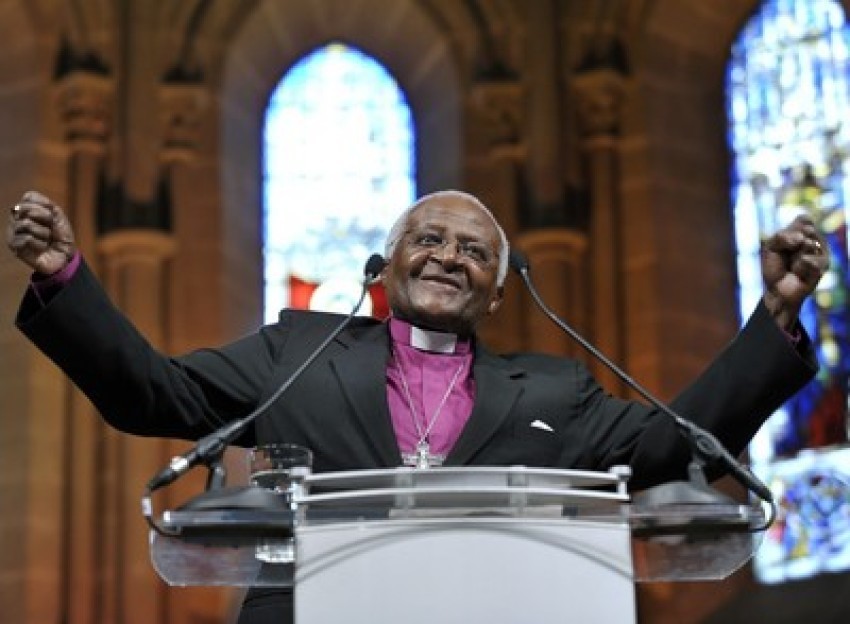Church leaders pay tribute to Archbishop Desmond Tutu who died at age 90

Archbishop Desmond Tutu, a pivotal figure in ending apartheid in South Africa, has died at age 90.
Tutu, known affectionately as 'Arch,' was a Nobel Peace Prize laureate and worked closely with Nelson Mandela to end racial segregation in South Africa.
He also broke barriers in the Anglican church, becoming the first black archbishop of Cape Town.
The Archbishop of Canterbury, Justin Welby, called Tutu a "pioneer" and said his death was "a great loss."
He said he had received news of Tutu's death with "profound sadness" but also "profound gratitude" because of the impact of his life.
"Arch's love transformed the lives of politicians and priests, township dwellers and world leaders. The world is different because of this man," he said.
"Archbishop Tutu was a prophet and priest, a man of words and action, one who embodied the hope and joy that were the foundations of his life. He was a man of extraordinary personal courage and bravery: when the police burst into Cape Town Cathedral, he defied them by dancing down the aisle.
"He was a man of enormous vision: seeing the possibilities for building the Rainbow Nation long before anyone else, except perhaps President Mandela.
"His vision and bravery were allied with a canny political sense and wisdom, enabling him to be a healer and apostle of peace while so many still saw wounds and war."
The present Archbishop of Cape Town, Thabo Makgoba, remembered Tutu as a man who took God, prayer and the Scriptures "deadly seriously."
"Prayer, the Scriptures and his ministry to the people God entrusted to his care were at the heart of his life," he said.
He also remembered him as someone committed to justice who leaves behind a legacy of "moral strength, moral courage and clarity."
"He wanted every human being on Earth to experience the freedom, the peace and the joy that all of us could enjoy if we truly respected one another as people created in the image of God," he said.
"Because he believed this, and because he worshiped God, he feared no one. He named wrong wherever he saw it and by whomever it was committed.
"He challenged the systems that demeaned humanity. He could unleash a righteous anger on those — especially the powerful — who inflicted suffering upon those the Bible calls 'the least of these, my brothers (and sisters).'
"And when the perpetrators of evil experienced a true change of heart, he followed the example of His Lord and was willing to forgive.
"Desmond Tutu's legacy is moral strength, moral courage and clarity. He felt with the people. In public and alone, he cried because he felt people's pain.
"And he laughed — no, not just laughed, he cackled with delight when he shared their joy."
The Archbishop of York, Stephen Cottrell, said Tutu was "a giant" not only of the faith but of his nation of South Africa.
"One of the great and abiding images of the second half of the 20th century was Desmond Tutu and Nelson Mandela dancing in the courtroom at the end of the closing session of the Truth and Reconciliation Commission in Cape Town. Nelson Mandela asked his friend Desmond Tutu to chair the Commission," Cottrell said in a statement.
"It was a bold and creative way of helping a nation divided brutally between black and white learn to live in glorious technicolor by facing up to the horrors of its past and by putting the Christian imperative for forgiveness alongside the need for truth as the only way of achieving reconciliation.
"And Desmond Tutu was asked to chair it because this incredibly joyful little disciple of Jesus Christ was one of the few people in South Africa other than Nelson Mandela himself, who could unite the nation and carry the trust of everyone.
"In this respect, he was a giant.
"The world itself feels a little smaller without him."
The World Council of Churches called him "a unique character."
"His contagious sense of humor and laughter has helped to resolve many critical situations in South Africa's political and church life. He was able to break almost any deadlock. He shared with us the laughter and grace of God many a time," it said.
South African newspaper TimesLive reports that church officials are planning a weeklong send-off for the church leader that will include a lying in state ceremony, an ecumenical service and a requiem mass.
South African President Cyril Ramaphosa thanked Tutu for the gift of "a liberated South Africa."
He said Tutu's death marked "another chapter of bereavement in our nation's farewell to a generation of outstanding South Africans."
British Prime Minister Boris Johnson said he was "deeply saddened" by the death of Tutu.
"He was a critical figure in the fight against apartheid and in the struggle to create a new South Africa — and will be remembered for his spiritual leadership and irrepressible good humor," he said.
Tibet's spiritual leader the Dalai Lama called Tutu a "true humanitarian."
"The friendship and the spiritual bond between us was something we cherished," he said.
Originally published at Christian Today



























